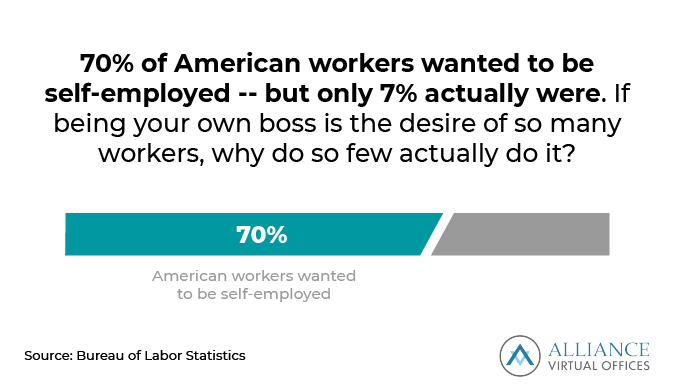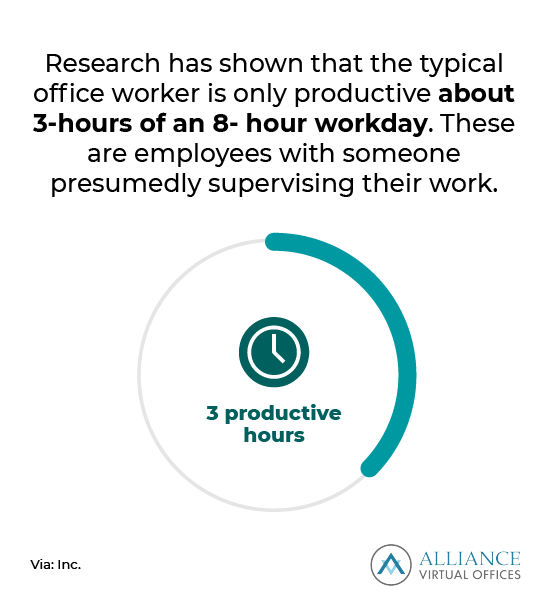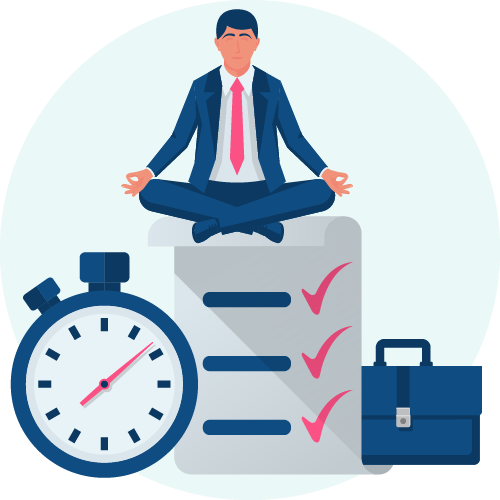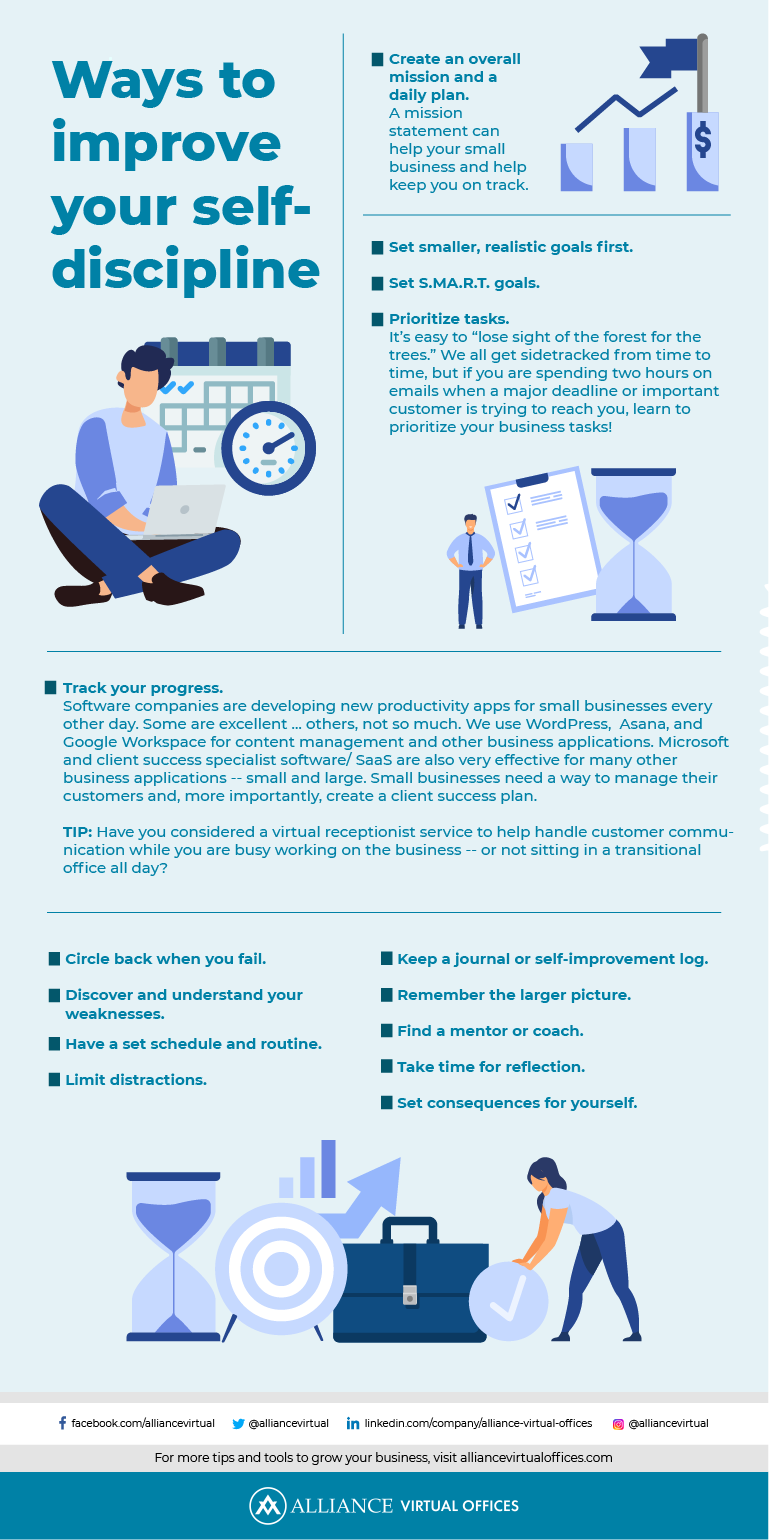- How to Improve Self-discipline
- 10 Productivity hacks for self-employed workers
- Research shows typical office workers are productive 3-hours out of an 8- hour workday
Q: How can sole proprietors and self-employed business owners maintain motivation and consistent productivity despite not having a direct supervisor or boss?
A: While many workers dream of working for themselves, many aren’t prepared and lack the self-discipline required to run a successful small business. This article provides realistic goals and actionable tips, backed up by data, to help stay motivated and productive when you don’t have a boss.
- The idea of being your own boss and the reality
- Being your own boss requires self-discipline
- 10 Productivity hacks for self-employed workers
- Further Reading
A report by the Bureau of Labor Statistics (BLS) claimed that 70% of American workers wanted to be self-employed — but only 7% actually were. If being your own boss is the desire of so many workers, why do so few actually do it?
Well, in many ways, the answer is obvious.
It can be much easier to apply for a job that already exists at a company that has it set up for you and waiting. Just hop online and fill out an application — or use the “easy apply” button on your LinkedIn or Indeed account.
While the job search can be frustrating, it can be a lot easier than starting from scratch and trying to build your own business — even if it’s a small business run by one person.
Many people — especially Americans, are still married to the idea that you need to work for an established company if you want to be able to afford healthcare, have a viable retirement plan, life insurance, and so on.
With a career at a large corporation, workers with the right skills can enjoy a lot of benefits that are “baked in” to the contract. Many of these “perks” won’t come with the business of working for yourself — at least for a while.
You know … things like 5 weeks of paid time off (PTO). Unlimited PTO. Highly Subsidized or free individual and family health insurance. Life insurance. Short and long-term disability insurance.
You get the idea. Many people are risk-averse. Sometimes life gets in the way, too.
A person dreams of working for themselves but they start working for a company until they can plan every detail out perfectly. They start a family. They get a promotion. A company car … or whatever. It can become more difficult to take the leap as you get more embedded into the life of working for someone else.
But things are changing.
The “great pause” created by the pandemic gave workers time to reflect on what they really want out of life.
More workers are letting go of the idea of working for an organization that does not give them the flexibility and purpose they want. People want to be more in control of their destiny — rather than handing it over to one entity.
“The U.S. is in the midst of an entrepreneurial renaissance with more workers opting to go into business for themselves,” said Jordyn Dahl, editor at LinkedIn News.
There are a lot of variations on this theme.
The media is full of grandiose-sounding phrases like The Great Resignation and ‘The Great Reshuffle’ and ‘The Labor Shortage,’ to name a few.
The fact is that many people do want to work for themselves — and they are finally making it happen. Some are turning side hustles into full-time careers.
Some are starting small businesses or large startups. Some workers realize the flexibility of being an independent freelancer is worth losing some of the “stability” that comes with working full-time for one company.
So, if you are one of these people — someone who works for themselves — congratulations!
One of the major challenges of not having a boss is learning how to be a good manager of your working life.
Self-employed workers, sole proprietors, independent contractors, and small business owners of many variations all have to manage their productivity, work-life balance, and keep their motivation charged up — without a boss there to remind them.
While you probably won’t miss those quarterly and annual performance reviews, you still want your business to be successful, right? Otherwise, what’s the point?
It’s going to be hard to make that a reality if your motivation is lacking or your productivity is inconsistent.
When you work for yourself, you don’t have someone to hold you directly accountable. It can be easy to mismanage your time, forget to prioritize, and sabotage your productivity.
Sure, you probably have clients that you need to please, but that’s different from having a direct boss whose job it is to make sure that you get all your work done on time.
The idea of being your own boss and the reality
While the idea of not having a boss sounds great to many workers — especially those who are constantly micromanaged — you’ll probably find that the journey isn’t all rainbows and unicorns. There will be challenges and no one will be there to guide you along.
You will be in command.
When you work for an individual or organization, you are often given a set of expectations, guidelines, and a framework to follow to do your work effectively.
Along with your job title and payment, most workers can usually expect something else that comes packaged with the traditional work arrangement: a boss.
The contemporary “boss” in the corporate world is often parodied in a negative light — at least in movies like Office Space or the sitcom The Office.
Drunk on power and totally incompetent, these caricatures roam the hallways of corporate offices searching for prey: a new employee to intimidate, a different worker to show favoritism, someone else to terminate for no reason at all.
While these types of bosses certainly exist, let’s hope most of them are being rapidly eradicated from the working world forever. Many workers have had wonderful bosses at one time or another. Their bosses (or managers, supervisors, directors, superiors, et al) were inspirational leaders that shared best practices, valuable experience, and mentorship.
Negative stereotypes aside, there is value in having someone there to hold you accountable.
In a world of mass distraction, procrastination can keep the most assiduous workers from accomplishing goals on time, meeting deadlines, and succeeding on the job. Without proper oversight, workers may have a tendency to do sloppy work or not get to required tasks on time — or at all.
Research has shown that the typical office worker is only productive about 3-hours of an 8- hour workday. These are employees with someone presumedly supervising their work.
What about workers that don’t have a boss or direct supervisor?
What about entrepreneurs, the self-employed, and freelancers?
Click here for tips on hiring freelancers.
While many from this group are indeed self-disciplined, industrious, and enterprising — they too struggle with staying on task, staying motivated, and staying productive.
Sometimes even more.
Being your own boss requires self-discipline
Let’s face it: every moment brings another opportunity to get distracted.
When you are the boss of your business, it can be easy to stay on schedule and consistently deliver results.
Consistently staying focused and delivering results consistently will be essential to maintaining a healthy and optimal business.
A lot of this will come down to being self-disciplined. Self-discipline is defined by Oxford Languages as:
“The ability to control one’s feelings and overcome one’s weaknesses; the ability to pursue what one thinks is right despite temptations to abandon it.”
Pretty simple, right?
Well, not really. That’s why there are hundreds of self-help books about it, why so many diets begin yet quickly crumble, relationships collapse, and — you guessed it — businesses fail.
Below are some simple ways to improve your self-discipline — if this is an area you need to work on. Without self-discipline, it will be difficult to improve the motivation and productivity aspects of being your own boss later in this post.
- Create an overall mission and a daily plan:
A mission statement can help your small business and help keep you on track.
- Set smaller, realistic goals first.
- Set S.MA.R.T. goals
- Prioritize tasks:
It’s easy to “lose sight of the forest for the trees.” We all get sidetracked from time to time, but if you are spending two hours on emails when a major deadline or important customer is trying to reach you, learn to prioritize your business tasks!
- Track your progress:
Software companies are developing new productivity apps for small businesses every other day. Some are excellent … others, not so much. We use WordPress, Asana, and Google Workspace for content management and other business applications. Microsoft and client success specialist software/ SaaS are also very effective for many other business applications — small and large. Small businesses need a way to manage their customers and, more importantly, create a client success plan.
TIP: Have you considered a virtual receptionist service to help handle customer communication while you are busy working on the business — or not sitting in a transitional office all day?
- Circle back when you fail.
- Discover and understand your weaknesses.
- Have a set schedule and routine.
- Limit distractions.
- Keep a journal or self-improvement log.
- Remember the larger picture.
- Find a mentor or coach.
- Take time for reflection.
- Set consequences for yourself.
10 Productivity hacks for self-employed workers
- Create a healthy morning routine:
Start the day in a positive way. Take some quiet time for yourself. Reflect. Journal. Meditate. Hit the gym or do some yoga. Set intentions.2
2. Establish a realistic schedule:
Set a daily and weekly schedule and make it realistic. Sure, keep it agile and flexible, but don’t bite off more than you can chew. Adjust as needed. Use a good calendar with reminders and segment your day.
3. Create a functional, inspiring workspace:
This is particularly important if you work from home. You need a place that is designed for productivity. Obviously, where you live (and your budget) may create some limitations.
4. Take healthy breaks:
When we work from home and are not “on the clock,” it can be easy to end up working all the time. Some people forget to take a stretch break. To eat lunch. Don’t be one of those people. You don’t want to burn out by year two of your self-employment experiment. Be good to yourself — and be productive at the same time. Balance is necessary. Take breaks. Avoid drifting to the opposite spectrum where you spend hours scrolling through the internet instead of staying on task — or take a midday break and not return to work again.
5. Proactively reduce distractions:
Workplaces that are distracting lose top talent and top dollars.
Reduce noise. Use noise-canceling headphones. Close tabs that clutter your desktop. Use Google’s distraction-free extension. Play instrumental music that won’t interfere with your concentration. If you have pets, send them to camp or hire help.
6. Use your calendar and other technology:
Microsoft and Google both have excellent calendars that can integrate with your smartphone. Use one of them or an equivalent. Set reminders. Segment parts of your day for specific tasks. Eliminate spending too much time on tasks that are not a priority.
7. Manage your time, plan your days, and prioritize tasks:
Time management is a skill and books have been written about it. Keep it simple. Write down a list of the most important things that need to be done each day and do the most important first. Don’t allow yourself to get sidetracked with every little side task that arises. Turn your phone off. Close all tabs except what is essential. Set timers. Use the Pomodoro Technique. Experiment with what works for you and stick to it.
8. Set weekly and quarterly goals
9. Find ways to be accountable
10. Automate and delegate as much as you can:
There are numerous project and task management software available (see above). Don’t go overboard — especially if this is your first rodeo — but take advantage of technology that can help with tedious tasks that need to be completed over and over again. There is no sense in wasting time on activities that can be done a lot more efficiently by software.
Read more: How to Set Up a Virtual Office
Thinking of joining the new movement of independent workers? Have you already started your own business but would like to know how to cut costs? Alliance Virtual Offices is here to help you on your journey!
Further Reading
- 10 Productivity Tools for the Sole Proprietor
- Sole Proprietorship | The U.S. Small Business Administration (SBA)
- Importance of Self Discipline in Entrepreneurship











